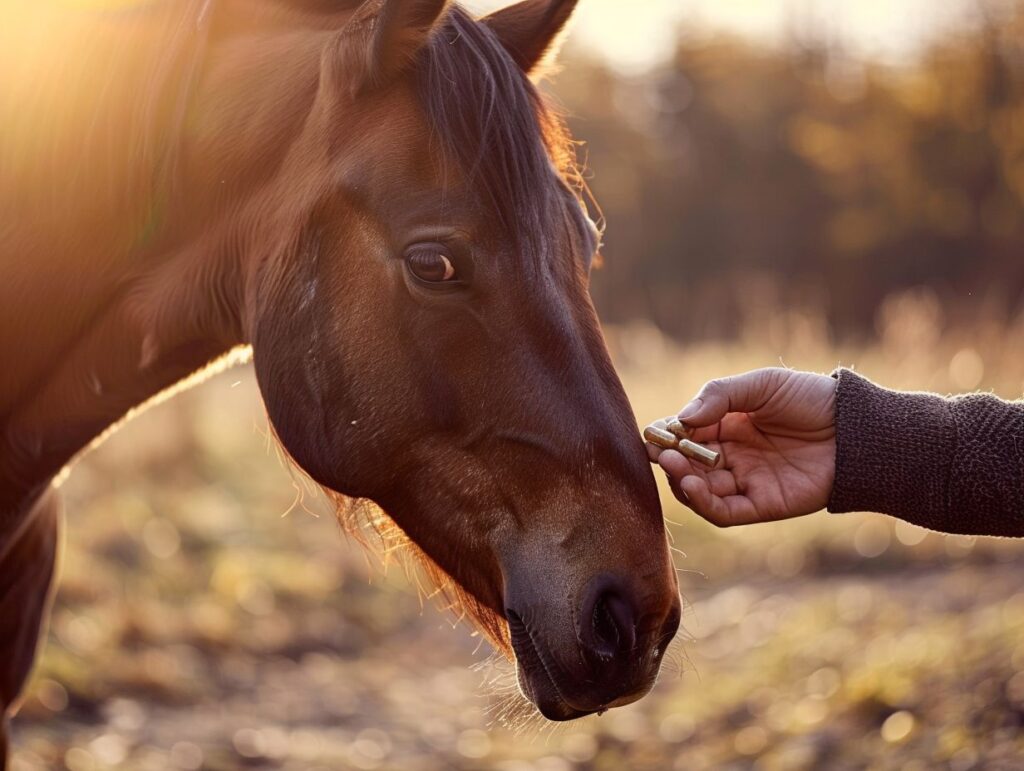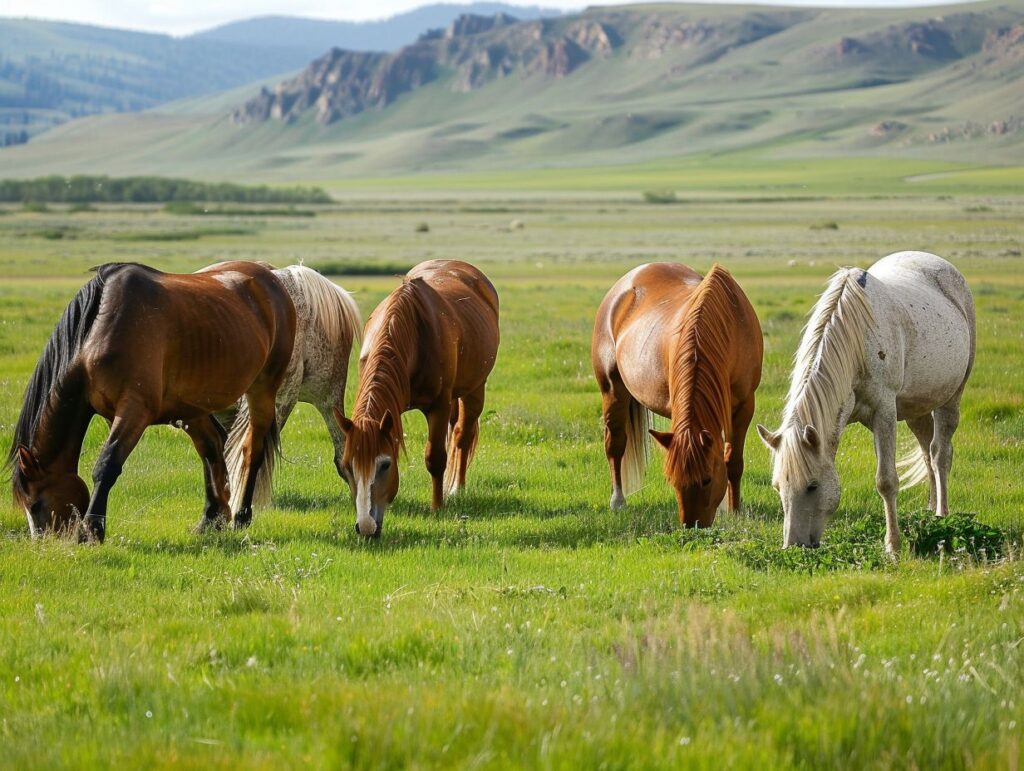As your beloved horses age, it is crucial to comprehend their evolving needs and how to effectively support their health and well-being. Common health concerns that older horses encounter, such as arthritis, digestive issues, and immune system support, will be explored.
Additionally, the advantages of supplements for older horses, including joint supplements, probiotics, antioxidants, and omega-3 fatty acids, will be discussed. By the conclusion, you will have gained a comprehensive understanding of selecting the appropriate supplements and executing a successful supplement regimen for your aging horse.
The Aging Horse
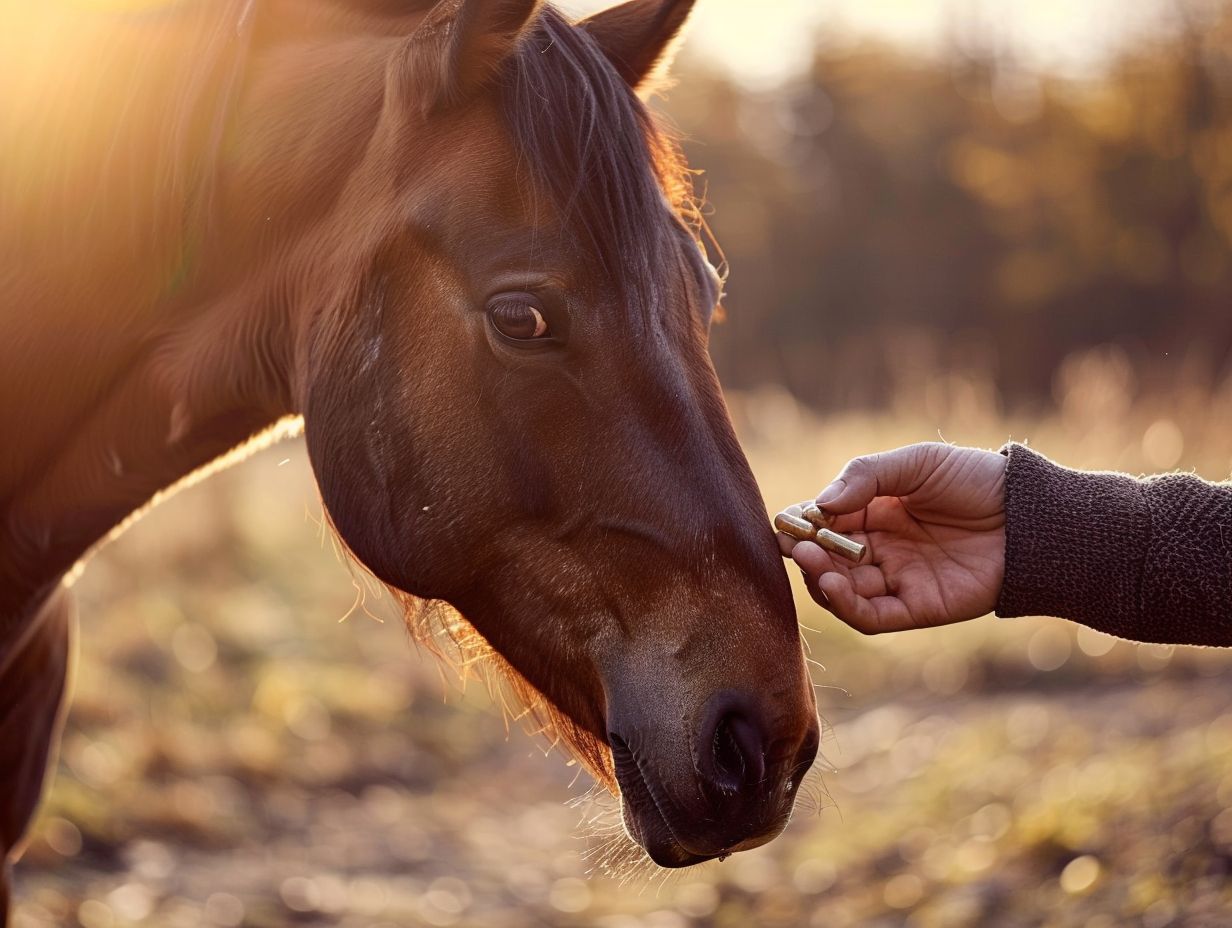
Caring for an older horse requires special attention and tailored nutrition to ensure their health and well-being as they age. With aging comes a range of considerations that need to be addressed to maintain the vitality and longevity of your equine companion.
One crucial aspect of caring for elderly horses is providing age-appropriate nutrition that supports their changing dietary needs. Older horses may require supplements to aid in digestion, joint health, and overall immune system support. Regular dental care is vital to ensure that older horses can effectively chew and digest their food. Monitoring weight and body condition becomes increasingly important as horses age, as obesity or undernourishment can lead to various health issues. Regular veterinary check-ups and tailored exercise routines are also essential components of maintaining the well-being of senior equines.
Understanding the Needs of Older Horses
Understanding the specific dietary and health needs of senior horses is crucial for providing optimal care. As horses age, their nutritional requirements change, and they become more susceptible to various health issues.
Tailoring the diet to meet the unique needs of older horses is essential in promoting their well-being. Providing senior horses with high-quality forage and specialized feeds rich in easily digestible nutrients can help support their digestive function and overall health.
Along with a balanced diet, certain supplements such as joint supplements, probiotics, and vitamins tailored for senior horses can be beneficial in maintaining their mobility and immune system. Regular veterinary check-ups and dental care are also vital aspects of senior horse management to ensure early detection and management of common age-related conditions.
Common Health Concerns in Older Horses
Older horses commonly face health challenges related to joint issues, digestive problems, and overall well-being that require attentive care and management. Addressing these concerns proactively is essential to ensure the comfort and health of aging equines.
-
As horses age, their joints may start to show signs of wear and tear, leading to stiffness and discomfort. It is crucial to provide appropriate supplements like glucosamine and chondroitin to support joint health.
-
Older horses are more susceptible to digestive issues such as colic and dental problems. Regular dental check-ups and a balanced diet tailored to their specific needs are vital for their overall well-being.
-
Proper grooming, exercise, and regular veterinary visits play a significant role in promoting senior horse health and ensuring a fulfilling life for these beloved companions.
Arthritis and Joint Health
Arthritis and joint health are significant concerns for older horses, impacting their mobility and overall quality of life. Providing appropriate joint support through supplements tailored for senior horses is crucial in managing these conditions.
These supplements often contain key ingredients such as glucosamine, chondroitin, and hyaluronic acid, which help maintain cartilage health and reduce inflammation in the joints.
Along with supplementation, regular exercise tailored to your horse’s condition can also play a vital role in improving joint flexibility and strength.
It’s essential to work closely with a veterinarian to develop a comprehensive care plan that includes a balanced diet, proper hoof care, and monitoring for any signs of discomfort or stiffness.
By taking proactive steps to support joint health, older horses can enjoy a better quality of life and remain active and comfortable in their senior years.
Digestive Issues
In older horses, digestive issues may arise due to changes in their digestive system and dietary requirements. To address these concerns effectively, it is crucial to incorporate supplements that promote digestive health and adhere to a proper feeding regimen.
As horses advance in age, their digestive efficiency may decrease, leading to challenges such as diminished nutrient absorption, colic, and ulcers. A fundamental aspect of a senior horse’s diet is providing them with high-quality forage and ensuring they have access to clean water. Introducing probiotics and prebiotics into their diet can aid in balancing gut flora and enhancing digestive function.
Additionally, maintaining regular dental care is essential to facilitate proper chewing and digestion in older horses. By adopting an inclusive approach that prioritizes digestive health, owners can contribute to enhancing the quality of life for their aging equine companions.
Immune System Support
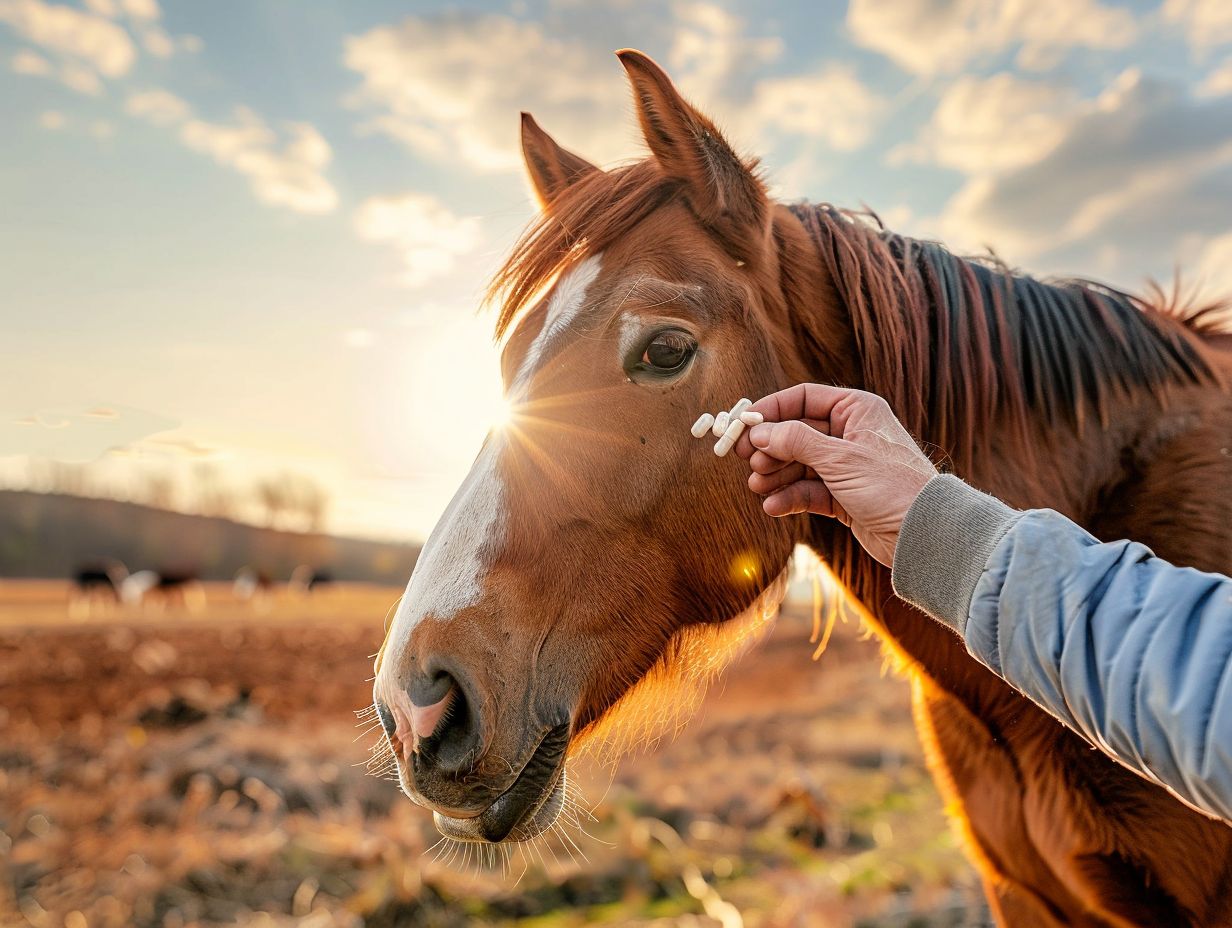
Supporting the immune system of elderly horses is crucial for maintaining their overall health and well-being. By providing the necessary supplements and care, you can help boost their immunity and protect them from illnesses.
As horses age, their immune systems may weaken, making them more susceptible to infections and diseases. Supplementing their diet with immune-boosting ingredients such as vitamin C, zinc, and probiotics can help fortify their defenses. Implementing good equine care practices like regular exercise, proper nutrition, and minimizing stressors can play a significant role in supporting their immune health. By prioritizing immune system support for older horses, you can ensure that they lead a healthier and more comfortable life in their golden years.
Supplements for Older Horses
In terms of supporting the health and vitality of older horses, supplements are essential. They provide the necessary nutrients to address the specific needs of senior equines, playing a crucial role in enhancing their overall well-being.
These supplements are specifically formulated to fill in the nutritional gaps that may develop as horses age, ensuring they receive the required levels of key vitamins, minerals, and antioxidants. Common components found in senior horse supplements include Selenium, Omega-3 fatty acids, glucosamine, and chondroitin, which support joint health, mobility, and immune function.
In addition, herbal remedies like turmeric and yucca can help reduce inflammation and offer natural pain relief for senior equines. By incorporating these recommended supplements into their daily diet, senior horses can uphold optimal health levels and experience an improved quality of life.
Joint Supplements
You need to provide older horses with joint supplements to ensure optimal joint function and mobility. Ingredients like glucosamine, chondroitin, and MSM are crucial in supporting joint health and reducing stiffness.
These key ingredients are well-known for their ability to enhance cartilage health, decrease inflammation, and maintain overall joint structure. Glucosamine aids in cartilage formation, chondroitin helps to preserve flexibility and elasticity of connective tissues, and MSM possesses anti-inflammatory properties that can alleviate joint discomfort.
Incorporating these supplements into a senior horse’s diet is essential for alleviating age-related joint issues and supporting the horse’s mobility, quality of life, and performance. Consistent use of these supplements can result in improved comfort and flexibility, enabling older horses to remain active and comfortable in their later years.
Probiotics
Probiotics are beneficial for older horses to maintain a healthy digestive system and promote a balanced gut flora. Including probiotics in their diet can assist in alleviating digestive issues and enhancing nutrient absorption.
As older horses age, their digestive efficiency may decrease, leading to a higher risk of digestive disturbances such as colic or diarrhea. Probiotic supplements are essential in improving the microbial diversity in their gut, which is crucial for proper digestion. By promoting the proliferation of beneficial bacteria, probiotics can help eliminate harmful pathogens that may trigger digestive problems. Studies have shown that probiotics play a vital role in breaking down and assimilating nutrients from feed, ensuring that older horses receive the necessary vitamins and minerals required for optimal health.
Antioxidants
You need to ensure that older horses receive adequate antioxidants to combat oxidative stress, promote overall health, and support their vitality as they age. Including antioxidants in their diet can help boost their immune system and protect against cell damage.
These powerful compounds play a crucial role in neutralizing harmful free radicals that can lead to various aging-related issues in senior horses. By reducing oxidative stress, antioxidants help maintain healthy cellular function and minimize the risk of age-related diseases.
Additionally, antioxidants contribute to supporting joint health, cognitive function, and digestive system efficiency in aging horses, ultimately enhancing their overall well-being and quality of life. Incorporating a variety of antioxidant-rich foods or supplements can be a beneficial way to ensure that senior horses receive the necessary support for their health and vitality.
Omega-3 Fatty Acids
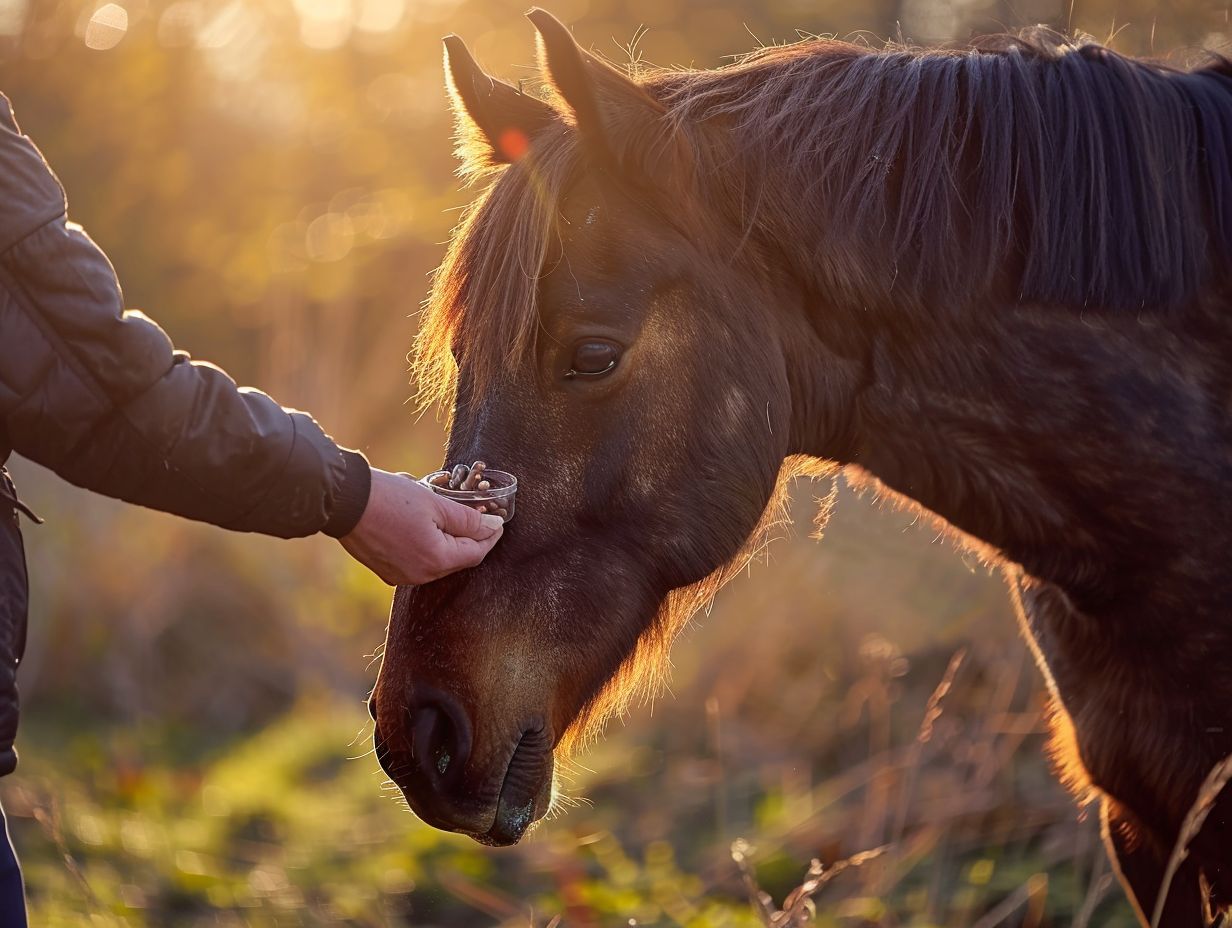
Omega-3 fatty acids are beneficial for older horses to maintain coat health, support joint mobility, and enhance overall well-being. Including omega-3 supplements in their diet can have positive effects on their skin, coat, and joint function.
These essential fatty acids are known for their anti-inflammatory properties, which can help alleviate joint stiffness and discomfort in senior horses. Along with supporting joint health, omega-3s can also improve cardiovascular function and boost the immune system, providing a holistic approach to maintaining the health of aging equines.
By incorporating omega-3-rich sources such as flaxseed or fish oil into their feeding regimen, horse owners can contribute to the longevity and vitality of their elderly equine companions.
Choosing the Right Supplements
When selecting supplements for your senior horse, consider factors such as their diet, weight management needs, muscle tone requirements, and hoof quality. It is essential to create a balanced supplement regimen tailored to address their specific needs to promote overall health.
Incorporating diet considerations is crucial to ensuring your senior equine companion receives the necessary nutrients that may be lacking due to aging. Senior horses often benefit from additional support for joint health and digestion, which can be provided through supplements containing glucosamine and probiotics. Managing weight is important to maintaining a healthy body condition score for your horse. Supplements that assist in weight control and metabolism can help regulate your senior horse’s weight. Additionally, supporting muscle tone with protein-rich supplements and promoting hoof health with biotin-enriched options can enhance their overall well-being.
Implementing a Supplement Plan
When implementing a structured supplement plan for your elderly horse, you must establish a feeding regimen that meets their nutritional requirements. This plan may involve incorporating protein supplements to support their muscle tone and overall health.
Consider dividing your horse’s daily feedings into smaller, more frequent meals to facilitate digestion and nutrient absorption. It is crucial to ensure your elderly horse has access to fresh, clean water, as they are more susceptible to dehydration. Monitoring their body condition and seeking advice from a veterinarian for tailored guidance on specific dietary needs are essential steps. Gradually introducing protein-rich supplements and adjusting the amounts based on their activity level and condition can help in maintaining muscle mass and promoting their overall well-being.
Tips for Success
To ensure the success of your senior horse’s supplement regimen, it is important to consider incorporating essential nutrients such as selenium, zinc, vitamin E, and vitamin C into their diet. These vitamins and minerals play a crucial role in supporting the health and well-being of your horse.
Selenium, for example, is vital for the proper functioning of your horse’s immune system and can help in reducing inflammation. Zinc is necessary for maintaining healthy skin, hooves, and coat, thereby promoting an overall healthy physical appearance. Vitamin E serves as a potent antioxidant that protects cells from damage and supports muscle function. Additionally, vitamin C boosts the immune system and assists in collagen production, particularly beneficial for joint health.
By focusing on these key nutrients in your senior horse’s supplement plan, you can optimize their diet and ensure they receive essential support for their overall well-being.
Additional Care Considerations for Senior Horses
Along with nutrition and supplements, it is essential to ensure proper hoof quality, coat health, and muscle tone for the overall well-being of senior horses. Regular grooming, exercise, and monitoring are important practices that can help maintain their physical condition.
When caring for a senior horse’s hooves, it is crucial to perform regular trimming and check for signs of thrush or other hoof issues. A shiny and healthy coat not only reflects good grooming practices but also serves as an indicator of the horse’s overall health.
Implementing a balanced exercise routine, customized to the horse’s age and physical condition, can be beneficial in improving muscle tone and joint flexibility. Monitoring senior horses for any changes in mobility, weight, or behavior is essential for detecting any health issues early on, which enables prompt veterinary care.
Frequently Asked Questions
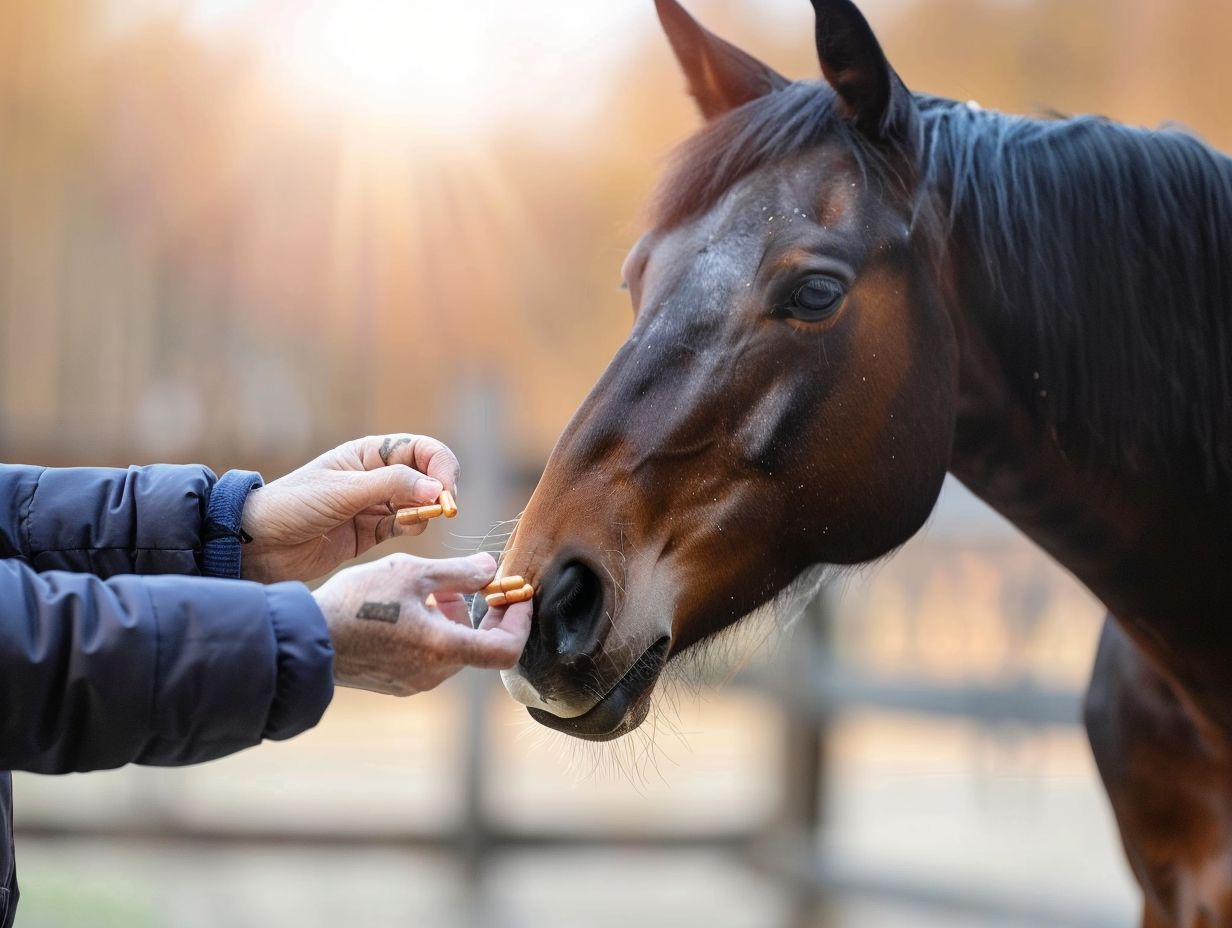
What supplements should I give my older horse?
As horses age, their bodies may require additional support to maintain their health and well-being. It is important to consult with your veterinarian before starting any new supplements, but there are a few that are commonly recommended for older horses.
What is a joint supplement and does my older horse need one?
A joint supplement is a type of supplement that contains ingredients to support joint health and reduce inflammation. Older horses may benefit from a joint supplement to help ease any stiffness or discomfort they may experience in their joints.
Are there any supplements that can help with digestion for my older horse?
Yes, there are supplements available that can aid in digestion for older horses. These supplements often contain probiotics, prebiotics, and digestive enzymes to support a healthy digestive system.
What are omega-3 fatty acid supplements and how can they benefit my older horse?
Omega-3 fatty acid supplements are commonly recommended for older horses as they can help with joint inflammation, skin and coat health, and overall immune system support.
Do older horses need a vitamin and mineral supplement?
It is important for older horses to have a well-balanced diet, but a vitamin and mineral supplement may also be necessary to ensure they are getting all the nutrients they need. Your veterinarian can help determine if your older horse would benefit from a vitamin and mineral supplement.
Can I give my older horse too many supplements?
Yes, it is possible for your older horse to have too many supplements. It is important to consult with your veterinarian and carefully read the labels of any supplements you are considering giving to your horse. Some ingredients may overlap and could potentially cause harmful effects if given in excessive amounts.
